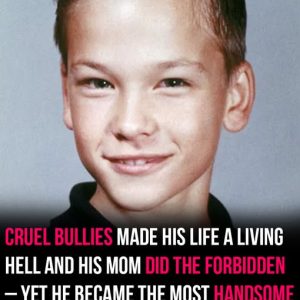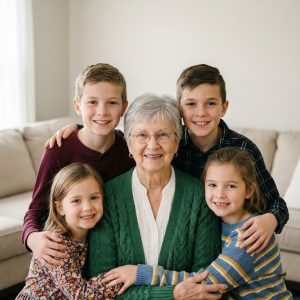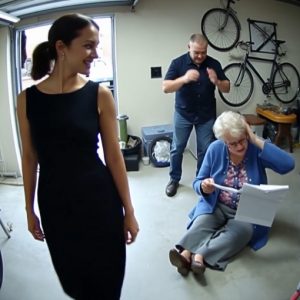Twelve-year-old Malik Turner wasn’t the kind of kid who liked drawing attention to himself. He preferred quiet corners, books, and the comfort of a small circle of trusted friends. But on the morning of Career Day, even those comforts felt distant.
He lay in bed staring at the glow of dawn creeping across his wall, replaying the promise his father had made the night before: “I’ll be there, son. I won’t let you down.”
Career Day always arrived with excitement, but also with a kind of pressure that Malik felt more intensely than his classmates. He understood why other students talked proudly about their parents — they saw them daily at school events, sports games, weekend fairs, and community gatherings.
Malik didn’t have that. His father’s work schedule was unpredictable, demanding, and often invisible to outsiders. Although his dad’s absence was not neglect but duty, explaining that to other kids wasn’t easy.
He got dressed slowly, brushing lint off his shirt with a nervous energy he couldn’t shake. He checked himself in the mirror but barely recognized the anxious expression looking back. Malik wasn’t worried about presenting. He was worried about being believed.
As he walked out the door, he remembered the nights when his father would tuck him in wearing fatigues, smelling faintly of metal and cold air.
Those nights reminded Malik that his dad’s job wasn’t a simple one — it carried weight, responsibility, and sacrifice. But none of that mattered to children who mocked what they didn’t understand.
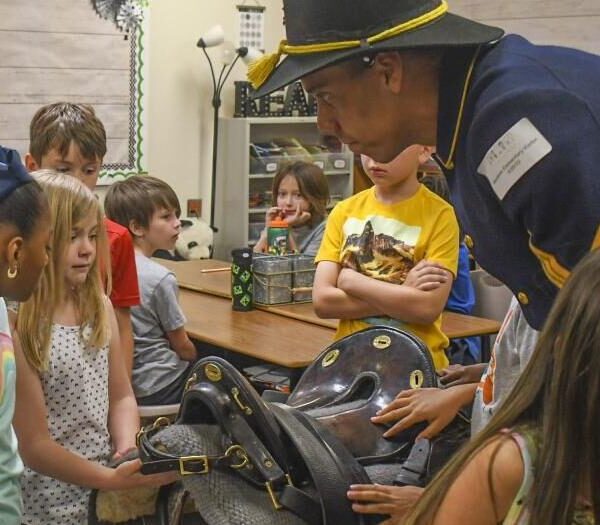
At school, the hallways buzzed louder than usual. Posters promoting “Career Day” hung on the walls, decorated with stars and bright colors. Students clustered in groups, boasting about who would be visiting their class.
Malik overheard excited chatter: “My mom’s bringing equipment from the fire station!” — “My aunt’s showing her surgeon tools!” — “My dad’s bringing a police dog!”
Malik walked past them quietly, hoping today would go smoothly, hoping he would not become a punchline again.
Inside the classroom, Mrs. Howard stood at the front, her hands clasped excitedly. “I’m so proud of all of you!” she announced. “Today we get to learn from the people who help shape your lives.” Her enthusiasm filled the room, and children clapped eagerly.
Malik sat at his desk, staring at the clock. His stomach twisted every time the second hand moved. He rehearsed his line silently: “My dad works at the Pentagon.”
It sounded strong in his head — until he imagined the reactions.
The first few parents spoke proudly about their jobs. They brought props, uniforms, tools, and handouts. The class applauded after each one, and the room felt warm and inviting.
But as the list grew shorter, Malik felt pressure rising in his chest. His name was getting closer. His father still wasn’t there.
Finally, Mrs. Howard called his name.
Malik stood slowly, feeling every eye in the room settle on him. He gripped the side of his desk for support. His voice trembled at first but grew steadier as he forced out the words: “My dad works at the Pentagon.”
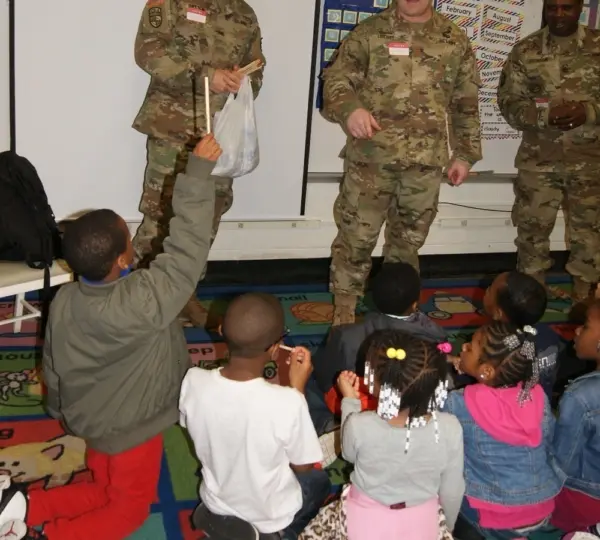
The silence lasted only a second.
Then came the laughter.
It started with a snort from the back row, then a giggle from the right side, then a full wave of laughter flooding the classroom. Malik’s chest tightened. He felt heat climb up his neck. His ears rang with embarrassment.
Ethan Miller leaned back in his seat, grinning widely, waving a hand dismissively. “Dude, stop lying,” he said loudly. “Your dad doesn’t even show up! He never comes to anything.”
Those words hurt more than the laughter, because they echoed an insecurity Malik carried quietly. The absence wasn’t an issue of love — it was the burden of duty. But Ethan didn’t care.
Malik swallowed, trying to steady himself. “He is coming,” he insisted softly. “He works there. He said he’d be here.”
Ethan mimicked fake crying, wiping imaginary tears. “Aww, the Pentagon! Maybe he’s a secret agent or something!” He glanced around, encouraging the laughter.
Mrs. Howard stepped in, but her tone carried doubt. “Malik, sweetie,” she said gently, “you don’t need to make up stories to feel included.”
The words hit him like a punch.
He wasn’t trying to impress anyone. He wasn’t trying to make himself special. He was simply telling the truth — a truth nobody seemed willing to accept.
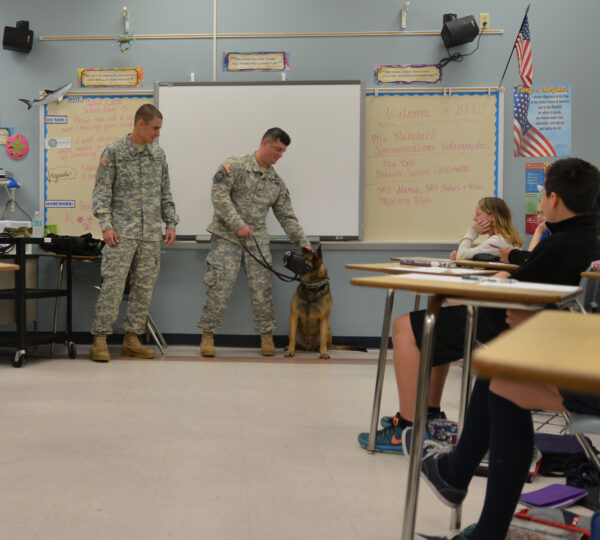
The class kept laughing, whispers spread across desks, and Malik stared down at the floor, wishing he could disappear. He wondered whether his father would really show. He wondered whether the mockery would get worse. He wondered if this day would follow him forever.
Just when Ethan opened his mouth to deliver another jab, a firm knock echoed through the classroom.
The laughter died instantly.
Mrs. Howard hesitated, then walked to the door. When she opened it, her entire expression changed — her eyebrows lifted, her mouth parted slightly, and the color drained from her face.
Standing tall in the doorway was a man in a crisp navy uniform. His boots were polished to perfection. His medals shimmered under the hallway lights. His posture was impeccable, and his presence filled the room even before he stepped inside.
“Good morning,” he said warmly. “I’m Colonel Anthony Turner. I’m Malik’s father.”
The room went silent. Utter silence. Not even a whisper.
Every mocking face froze.
Malik slowly lifted his head. His father walked in confidently, his voice calm and steady — the same tone he used at home when reminding Malik to trust himself.

Colonel Turner approached his son first, placing a strong yet gentle hand on his shoulder. “I’m proud of you,” he said quietly.
The class stared in disbelief. Mrs. Howard stood rigid, horrified that she had doubted him. Ethan’s smug grin vanished completely. He sank into his chair as if trying to hide.
Colonel Turner began talking about his career — not boasting, not intimidating, but explaining with humility and clarity. He spoke about the importance of intelligence work, coordination, national security, and making decisions that affected millions. He described early mornings, late nights, and missions that required courage and focus.
Students who moments earlier had mocked Malik listened now with admiration and awe. For the first time, they realized that the man they doubted was someone whose work carried immense responsibility.
As the Colonel continued, Malik watched the transformation around the room. The same students who had laughed were now leaning in, fascinated by every detail. Even Ethan couldn’t hide the amazement on his face. The disbelief had melted away completely.
When Colonel Turner finished, the class erupted in genuine applause — loud, heartfelt, and full of respect.
Afterward, Mrs. Howard approached Malik with remorse. “I’m so sorry,” she said quietly. “I should have believed you.”
Malik nodded politely, though the hurt still lingered.
As the Colonel prepared to leave, Ethan shuffled over. His face was flushed, and his voice trembled. “Hey… Malik… I’m sorry. I didn’t know.”
Malik didn’t say much, but the small nod he gave carried dignity. He didn’t need to gloat. He didn’t need revenge. The truth had spoken louder than any insult.
When Malik and his father left the classroom side by side, Malik felt taller. He felt stronger. He felt seen.
For the first time in a long time, the world recognized the truth about him — not because he shouted it, but because it walked through the door wearing a uniform that left everyone speechless.
And that day, a boy who had been mocked finally earned the respect he always deserved.
Twelve-year-old Malik Turner wasn’t the kind of kid who liked drawing attention to himself. He preferred quiet corners, books, and the comfort of a small circle of trusted friends. But on the morning of Career Day, even those comforts felt distant.
He lay in bed staring at the glow of dawn creeping across his wall, replaying the promise his father had made the night before: “I’ll be there, son. I won’t let you down.”
Career Day always arrived with excitement, but also with a kind of pressure that Malik felt more intensely than his classmates. He understood why other students talked proudly about their parents — they saw them daily at school events, sports games, weekend fairs, and community gatherings.
Malik didn’t have that. His father’s work schedule was unpredictable, demanding, and often invisible to outsiders. Although his dad’s absence was not neglect but duty, explaining that to other kids wasn’t easy.
He got dressed slowly, brushing lint off his shirt with a nervous energy he couldn’t shake. He checked himself in the mirror but barely recognized the anxious expression looking back. Malik wasn’t worried about presenting. He was worried about being believed.
As he walked out the door, he remembered the nights when his father would tuck him in wearing fatigues, smelling faintly of metal and cold air.
Those nights reminded Malik that his dad’s job wasn’t a simple one — it carried weight, responsibility, and sacrifice. But none of that mattered to children who mocked what they didn’t understand.

At school, the hallways buzzed louder than usual. Posters promoting “Career Day” hung on the walls, decorated with stars and bright colors. Students clustered in groups, boasting about who would be visiting their class.
Malik overheard excited chatter: “My mom’s bringing equipment from the fire station!” — “My aunt’s showing her surgeon tools!” — “My dad’s bringing a police dog!”
Malik walked past them quietly, hoping today would go smoothly, hoping he would not become a punchline again.
Inside the classroom, Mrs. Howard stood at the front, her hands clasped excitedly. “I’m so proud of all of you!” she announced. “Today we get to learn from the people who help shape your lives.” Her enthusiasm filled the room, and children clapped eagerly.
Malik sat at his desk, staring at the clock. His stomach twisted every time the second hand moved. He rehearsed his line silently: “My dad works at the Pentagon.”
It sounded strong in his head — until he imagined the reactions.
The first few parents spoke proudly about their jobs. They brought props, uniforms, tools, and handouts. The class applauded after each one, and the room felt warm and inviting.
But as the list grew shorter, Malik felt pressure rising in his chest. His name was getting closer. His father still wasn’t there.
Finally, Mrs. Howard called his name.
Malik stood slowly, feeling every eye in the room settle on him. He gripped the side of his desk for support. His voice trembled at first but grew steadier as he forced out the words: “My dad works at the Pentagon.”

The silence lasted only a second.
Then came the laughter.
It started with a snort from the back row, then a giggle from the right side, then a full wave of laughter flooding the classroom. Malik’s chest tightened. He felt heat climb up his neck. His ears rang with embarrassment.
Ethan Miller leaned back in his seat, grinning widely, waving a hand dismissively. “Dude, stop lying,” he said loudly. “Your dad doesn’t even show up! He never comes to anything.”
Those words hurt more than the laughter, because they echoed an insecurity Malik carried quietly. The absence wasn’t an issue of love — it was the burden of duty. But Ethan didn’t care.
Malik swallowed, trying to steady himself. “He is coming,” he insisted softly. “He works there. He said he’d be here.”
Ethan mimicked fake crying, wiping imaginary tears. “Aww, the Pentagon! Maybe he’s a secret agent or something!” He glanced around, encouraging the laughter.
Mrs. Howard stepped in, but her tone carried doubt. “Malik, sweetie,” she said gently, “you don’t need to make up stories to feel included.”
The words hit him like a punch.
He wasn’t trying to impress anyone. He wasn’t trying to make himself special. He was simply telling the truth — a truth nobody seemed willing to accept.

The class kept laughing, whispers spread across desks, and Malik stared down at the floor, wishing he could disappear. He wondered whether his father would really show. He wondered whether the mockery would get worse. He wondered if this day would follow him forever.
Just when Ethan opened his mouth to deliver another jab, a firm knock echoed through the classroom.
The laughter died instantly.
Mrs. Howard hesitated, then walked to the door. When she opened it, her entire expression changed — her eyebrows lifted, her mouth parted slightly, and the color drained from her face.
Standing tall in the doorway was a man in a crisp navy uniform. His boots were polished to perfection. His medals shimmered under the hallway lights. His posture was impeccable, and his presence filled the room even before he stepped inside.
“Good morning,” he said warmly. “I’m Colonel Anthony Turner. I’m Malik’s father.”
The room went silent. Utter silence. Not even a whisper.
Every mocking face froze.
Malik slowly lifted his head. His father walked in confidently, his voice calm and steady — the same tone he used at home when reminding Malik to trust himself.

Colonel Turner approached his son first, placing a strong yet gentle hand on his shoulder. “I’m proud of you,” he said quietly.
The class stared in disbelief. Mrs. Howard stood rigid, horrified that she had doubted him. Ethan’s smug grin vanished completely. He sank into his chair as if trying to hide.
Colonel Turner began talking about his career — not boasting, not intimidating, but explaining with humility and clarity. He spoke about the importance of intelligence work, coordination, national security, and making decisions that affected millions. He described early mornings, late nights, and missions that required courage and focus.
Students who moments earlier had mocked Malik listened now with admiration and awe. For the first time, they realized that the man they doubted was someone whose work carried immense responsibility.
As the Colonel continued, Malik watched the transformation around the room. The same students who had laughed were now leaning in, fascinated by every detail. Even Ethan couldn’t hide the amazement on his face. The disbelief had melted away completely.
When Colonel Turner finished, the class erupted in genuine applause — loud, heartfelt, and full of respect.
Afterward, Mrs. Howard approached Malik with remorse. “I’m so sorry,” she said quietly. “I should have believed you.”
Malik nodded politely, though the hurt still lingered.
As the Colonel prepared to leave, Ethan shuffled over. His face was flushed, and his voice trembled. “Hey… Malik… I’m sorry. I didn’t know.”
Malik didn’t say much, but the small nod he gave carried dignity. He didn’t need to gloat. He didn’t need revenge. The truth had spoken louder than any insult.
When Malik and his father left the classroom side by side, Malik felt taller. He felt stronger. He felt seen.
For the first time in a long time, the world recognized the truth about him — not because he shouted it, but because it walked through the door wearing a uniform that left everyone speechless.
And that day, a boy who had been mocked finally earned the respect he always deserved.

